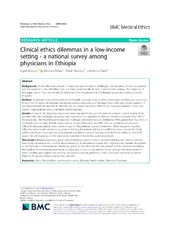| dc.contributor.author | Miljeteig, Ingrid | en_US |
| dc.contributor.author | Defaye, Frehiwot Berhane | en_US |
| dc.contributor.author | Desalegn, Dawit | en_US |
| dc.contributor.author | Danis, Marion | en_US |
| dc.date.accessioned | 2020-08-14T13:28:49Z | |
| dc.date.available | 2020-08-14T13:28:49Z | |
| dc.date.issued | 2019-09-13 | |
| dc.Published | Miljeteig I, Defaye FB, Desalegn DD, Danis M. Clinical ethics dilemmas in a low-income setting - a national survey among physicians in Ethiopia. BMC Medical Ethics. 2019;20:63 | eng |
| dc.identifier.issn | 1472-6939 | |
| dc.identifier.uri | https://hdl.handle.net/1956/23793 | |
| dc.description.abstract | Background Ethical dilemmas are part of medicine, but the type of challenges, the frequency of their occurrence and the nuances in the difficulties have not been systematically studied in low-income settings. The objective of this paper was to map out the ethical dilemmas from the perspective of Ethiopian physicians working in public hospitals. Method A national survey of physicians from 49 public hospitals using stratified, multi-stage sampling was conducted in six of the 11 regions in Ethiopia. Descriptive statistics were used and the responses to the open-ended question “If you have experienced any ethical dilemma, can you please describe a dilemma you have encountered in your own words?” were analyzed using a template analysis process. Results A total of 587 physicians responded (response rate 91,7%), and 565 met the inclusion criteria. Twelve of 24 specified ethically challenging situations were reported to be experienced often or sometimes by more than 50% of the physicians. The most frequently reported challenge concerned resource distribution: 93% agreed that they often or sometimes had to make difficult choices due to resource limitation, and 83% often or sometimes encountered difficulties because patients were unable to pay for the preferred course of treatment. Other frequently reported difficulties were doubts about doing good or harming the patient, relating to conflicting views, concern for family welfare, disclosure issues and caring for patients not able to consent. Few reported dilemmas related to end-of-life issues. The 200 responses to the open-ended question mirrored the quantitative results. Discussion Ethiopian physicians report ethical challenges related more to bedside rationing and fairness concerns than futility discussions and conflicts about autonomy as described in studies from high-income countries. In addition to the high report of experienced challenges, gravity of the dilemmas that are present in their narratives are striking. Recognition of the everyday experiences of physicians in low-income settings should prompt the development of ethics teaching and support mechanisms, discussion of ethical guidelines as well as increase our focus on how to improve the grave resource scarcity they describe. | en_US |
| dc.language.iso | eng | eng |
| dc.publisher | BMC | eng |
| dc.rights | Attribution CC BY | eng |
| dc.rights.uri | http://creativecommons.org/licenses/by/4.0/ | eng |
| dc.subject | Ethics | eng |
| dc.subject | Clinical ethics | eng |
| dc.subject | Low-income country | eng |
| dc.subject | Ethiopia | eng |
| dc.subject | Health worker | eng |
| dc.subject | Dilemma | eng |
| dc.subject | Physicians | eng |
| dc.title | Clinical ethics dilemmas in a low-income setting - a national survey among physicians in Ethiopia | en_US |
| dc.type | Peer reviewed | |
| dc.type | Journal article | |
| dc.date.updated | 2020-02-01T13:55:13Z | |
| dc.description.version | publishedVersion | en_US |
| dc.rights.holder | Copyright 2019 The Author(s) | |
| dc.identifier.doi | https://doi.org/10.1186/s12910-019-0402-x | |
| dc.identifier.cristin | 1741642 | |
| dc.source.journal | BMC Medical Ethics | |

